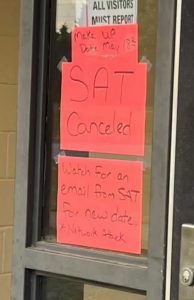OPINION – We Need to Stay in School
Jan 26, 2022
COVID has just passed its second birthday, and has left many people wondering how much longer? How much longer with the masks? When will the threat of hybrid and virtual schooling go away? As of now, Fayette County has allowed their students to go to school all five days a week with a mask mandate, but case numbers have many people puzzling how long that will last. The introduction of the highly contagious Omicron variant has convinced thousands of schools across the country to switch towards more virtual and socially distanced educating options. The main goal of switching over to virtual schooling is to improve physical health by stopping the spread of the COVID-19 virus, but it has devastating effects on mental health. Socially distanced learning not only affects the students, but also the parents of students and teachers.
A series of studies were pulled together from resources such as PubMed and Medline on the prevalence of mental health issues such as anxiety, depression, and stress in teachers. “In total, eight studies were included in this study. The results show that teachers report levels of anxiety (17%), depression (19%), and stress (30%),” says an article by PubMed. “The results suggest that teachers at different educational levels are experiencing adverse psychological symptomatology during the COVID-19 pandemic, and that anxiety levels vary between different countries. However, more international studies are needed to fully understand the impact of the pandemic on teachers’ mental health.”
The conclusion of a study done in Baltimore on teacher’s mental health concluded that, “The prevalence of anxiety, depression, and stress was high among teachers during the pandemic, with great variation between studies. Anxiety and stress were more prevalent in the Spanish study. The results show the need for measures for the care of teachers’ mental health, especially when returning to face-to-face classes.”
A study done in a Greek high school revealed “15.3% increase in depression, 17% increase in severe depression, 25.7% increase in anxiety, and 16.7% increase in severe anxiety after just one month of lockdowns.”
Andrea Hussong, a professor and associate director of clinical psychology in the department of psychology and neuroscience, has been studying the effects of COVID-19 on mental health and noted: “Studies that followed youth from before the pandemic to sometime in the first six months of the pandemic report increases in adolescent depression and negative effects but also little change or even decreases in anxiety, irritability and self-injury. As the pandemic has worn on, however, youth show more consistent elevations in anxiety, depression and stress.”
It has been found that the abrupt changes that today’s youth have had to face in recent years have caused a decline in the mental health of young people today. “With the abrupt mass transition to an online distance-learning model in schools, students’ home and school environments merged; residual stress from the school day knows no boundaries,” Christina Munoz, a writer for the Intercultural Development Research Association. “Preliminary findings from a ground-breaking participatory action-based research conducted by San Antonio students show that more than 71% of survey respondents consider virtual remote learning as contributing more stress than traditional in-person school.”
Senior Jocelyn Wang believes that the mask mandates are good, but we should be able to stay off of the hybrid schooling model. “I think there should be a mask mandate,” says senior Jocelyn Wang. “I don’t think that we should go back on hybrid because this is the second semester of my senior year and I do not want to lose any more time with my friends than I already have.”
Wang expresses the difference in her ability to learn material from times McIntosh was on hybrid and times McIntosh was on a green schedule. “I don’t learn on hybrid,” says Wang. “Every day that I was virtual, I didn’t retain any of that information.”
According to studies conducted at universities to measure the effectiveness of distance learning, students that attended school in-person were more likely to not drop out in addition to being more likely to pass. Additionally, it has been reported that class failure rates have increased dramatically with the introduction of distance learning in various public school systems.
“Class failure rates have skyrocketed in school systems from Fairfax County, Virginia, to Greenville, South Carolina,” a USA Today article cites. “Fewer kindergarteners met early literacy targets in Washington, D.C., this fall. And math achievement has dropped nationwide, according to a report that examined scores from 4.4 million elementary and middle school students.”
Personally, I do not believe that we should go back to a hybrid model. Not only are the rapid changes affecting mental health, but it is also affecting the quality of education that students are getting. Not only is distance learning less effective, it also leads to students feeling more depressed, lonely, and anxious. For me, I learn much better when in the school building because not only does the building allow me to get immediate help and attention on topics that I am struggling with, it also allows me to interact with my friends and fellow classmates.
https://www.reuters.com/world/us/omicron-teaches-hard-lessons-us-schools-revamp-return-holidays-2022-01-03/
https://nces.ed.gov/fastfacts/display.asp?id=372
https://www.forbes.com/sites/jackkelly/2022/01/03/public-schools-and-universities-are-once-again-going-online-both-parents-and-students-are-dreading-the-results/?sh=6d83156951b5
https://kentuckycounselingcenter.com/mental-health-effects-of-online-learning/
https://pubmed.ncbi.nlm.nih.gov/34573192/
https://pubmed.ncbi.nlm.nih.gov/34871251/
https://www.frontiersin.org/articles/10.3389/feduc.2021.719539/full#:~:text=The%20Mental%20Health%20of%20High%20School%20Students%20During%20the%20COVID%2D19%20Pandemic,-Maya%20E.&text=The%20American%20Psychological%20Association%20(APA,during%20the%20COVID%2D19%20pandemic.&text=Exercise%20time%20helps%20reduce%20mental,0.153%2C%20p%20%3D%200.037).
https://www.unicef.org/lac/en/impact-covid-19-mental-health-adolescents-and-youth
Mental Health Implications of Virtual Learning on Student Engagement
https://www.insidehighered.com/news/2021/08/06/do-college-students-perform-worse-online-











